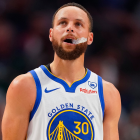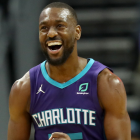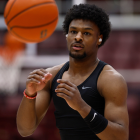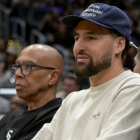Late in the fourth quarter of a Sunday afternoon game, a 6-foot-6 guard drove to the paint, pump faked, left his feet, hung in the air and made a heavily contested floater to beat the Detroit Pistons. It was his sixth game-tying or go-ahead shot in the final minute this season -- no one in the league has more -- and his third game-winner in the first three weeks of this calendar year.
This guard is averaging 17 points, 8.2 assists and 4.2 rebounds per 36 minutes and he is 18th in real-plus minus, above Kevin Durant, Karl-Anthony Towns and Damian Lillard. The guard is not, however, a household name. He is still trying to make the official NBA Twitter account tag him in tweets so he can get more followers.
This is Spencer Dinwiddie, aka @SDinwiddie_25, the man who kept the Brooklyn Nets competitive without their two headliners, against all odds and the desires of the NBA's most desperate team. The Cleveland Cavaliers, currently residing in Strugglesville, acquired Brooklyn's first-round pick as a main piece of last summer's Kyrie Irving-Isaiah Thomas trade. If it doesn't turn out to be that great, Dinwiddie's game-winners will haunt them.
At 18-29, the Nets have the league's eighth-worst record. If not for Dinwiddie -- he's the only Net with a positive net rating -- one can only imagine where they would be in the standings. He came into the season thinking he'd have to fight to carve out a role behind Jeremy Lin and D'Angelo Russell, but when both of them went down with knee injuries, he became their most important player. This season, the Nets have been outscored by 7.9 points per 100 possessions with Dinwiddie on the bench.
"He's meant everything, really," Brooklyn forward Quincy Acy told CBS Sports. "He's been key to our success, in our successful games. He was thrown into a big role and he answered it better than anyone could ever hope for."
Dinwiddie didn't celebrate that game-winner, even though this was against the team that drafted him No. 38 in 2014 and dumped him to the Chicago Bulls two years later. When the shot went in, he appeared upset that the referees hadn't called a foul on the Pistons. When reporters asked what it meant to do this to Detroit, he simply asked how they would feel if they were in his shoes.
The trouble with that, of course, is that most people in his shoes never earn a chance to get revenge. Most second-round picks don't stick in the NBA, let alone have the ball in their hands at the end of games. Dinwiddie, however, never saw himself as a second-rounder. And despite the fact that two teams gave up on him, despite the fact that he had a career-threatening injury in college, despite the fact that he was playing for the NBA G League's Windy City Bulls 14 months ago, he never lost faith.
Dinwiddie believes he's the best player on the court even when competing with Hall of Famers. He believes he should be coming up clutch.
"If I hit a game-winning shot, right, and I run back down the court and shake my teammates hands, it's because I expected to make it," Dinwiddie told CBS Sports. "Because I've practiced or I feel I've worked harder than everybody else. So why would I then go nuts, go crazy if I expected to do that? People don't understand that part about me."
.@SDinwiddie_25 is CLUTCH in January! Relive each of his three go-ahead buckets in the final seconds since the new year.#WeGoHardpic.twitter.com/Q3lXl4Mfi5
— NBA (@NBA) January 22, 2018
To understand Dinwiddie, you must understand how he defines two types of confidence. There is belief in your abilities, which never wavered for him, and then there is situational confidence, which did. When he first arrived in Brooklyn, coach Kenny Atkinson thought of him as hesitant and unsure of himself on the court. Looking back, Dinwiddie doesn't disagree. In Detroit and Chicago, the coaches wanted him to take care of the ball and run the offense in short stints. Before his first game with the Nets, his instructions were completely different: Just go out there and show us something.
"It was kind of like, are you serious? Is this a test? What are you talking about?" Dinwiddie said.
Dinwiddie had become accustomed to looking over his shoulder after misses and turnovers. He had been used to spending tons of time on the bench. For validation, he thought back to his battles with Reggie Jackson, Brandon Jennings and D.J. Augustin in Pistons practice. He never forgot his 12-point, nine-assist game in a win over the Bulls as a rookie in his first start, which earned him postgame encouragement from Derrick Rose, nor his 20-point, eight-assist game against John Wall that same month.
These moments helped Dinwiddie feel like he belonged, but he knew he needed to be put in a situation where he could grow. In his words, Brooklyn took the leash off. The coaches did not care if he missed a 30-footer, missed a big shot or turned the ball over. According to Dinwiddie, that is exactly what produced the long 3-pointers, the game-winners and the second-best assist-to-turnover ratio in the NBA.
"I actually tweeted this not too long ago: The green light is the greatest drug known to man," Dinwiddie said. "When you feel like that and you feel like they believe in you and you already believe in yourself, I don't feel like nobody can stop me. It doesn't matter what mistake or whatever occurs because I feel like I'm still going to be playing, so I'll get it back or I'll learn from it or I won't make that mistake again or whatever it is. And that's why I give so much credit to them and why I'm so thankful for what this process has afforded me. Because I needed that. That was the missing piece to show this."
Dinwiddie describes himself as a pragmatic thinker. He was not surprised when the Bulls cut him in training camp, as they had just traded for Michael Carter-Williams the previous week and he was the only one of their five point guards on a non-guaranteed contract. When he was out of the league or on the bench, he wasn't visualizing what it would be like when he finally got a chance to run a team. Even just a few months ago, he was fully focused on fine-tuning his game and proving to Brooklyn's coaches that they should trust him with rotation minutes. Now that he is showing what he can do, he finds it weird that people seem so shocked to see it.
"Nobody gets to the league and is awful," Dinwiddie said. "Some people are more built to be good in this than others, right, but at the end of the day, when people are like, 'Yo, you got great overnight,' I'm like, 'That doesn't really make too much sense.' That's like saying I grew to 6-6 overnight. Everything is a process. And obviously I've made strides in my game, a lot of it due to the work that the coaching staff has put in with me. But at the same time it's not like I just suddenly woke up and realized how to play basketball when D'Angelo got hurt."
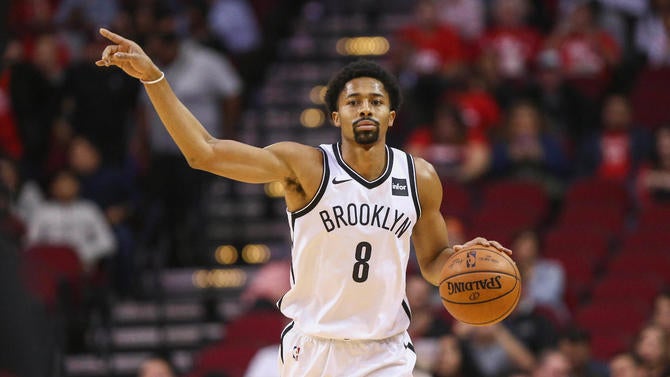
In January 2014, with Dinwiddie establishing himself as a first-round pick in his junior season at Colorado, he crumpled to the floor on a fast break against Washington. All of a sudden, his college career was over. It was unclear whether or not he'd ever be the same.
"I was dribbling down the court, boom," Dinwiddie said. "ACL, lateral meniscus, medial meniscus, MCL all gone. All torn. And being in the state of something that you can't control, all I could do is be like, this will never happen again -- I will make myself as bulletproof as possible so that it never happens again."
Dinwiddie approached rehab with Kobe-like obsessiveness, going vegan and sleeping with his leg raised and a cold compression wrap around it. He had regular, two-hour sessions in a hyperbaric chamber. He was supposed to be out for 12 months and came back in seven.
"That one injury changed my life," Dinwiddie said. "Because I was a hard worker -- like, I wanted to be in the NBA and everything and obviously the road shows that -- but it made it almost maniacal."
To this day, Dinwiddie's diet is 80 percent vegan. He has a strict, grueling offseason schedule that includes lifting, skill work and pick-up basketball six days a week. This is why, when he was trying to establish himself in the NBA and heard there were concerns about his work ethic, it hurt.
"I heard through the grapevine it was said here or there, whispers here or there," Dinwiddie said. "I was like, 'How can you even question that? Look at the track record.' But yeah, no, I don't play. In the summers, I'll be up at 5 a.m. running in the sand. All that stuff. This is not a game to me. I take it very seriously. And I want to win championships."
After a recent loss to the San Antonio Spurs, Dinwiddie apologized to his teammates for leaving points on the table. It was his third straight rough shooting night, and, despite leading a fourth-quarter comeback that gave Brooklyn a chance to win, he blamed himself for the team coming up short.
Acy said that Dinwiddie has the right personality for leadership and all of his teammates trust him. Part of that is that they know about how far he has come; part of it is that they see his dedication. Four years after that gruesome injury, Dinwiddie is stronger and more explosive than ever. Last Friday in a win against the Miami Heat, he gave the Nets a late lead with a driving, left-handed dunk.
"He's definitely very hands-on with the performance staff," Acy said. "He's the only one getting a massage every day -- we all get 'em, but he's very adamant about taking care of his body. He's in here on off days. Cold tub. Whatever he has to do for recovery. Even after games, he's in there getting 20-minute massages and stuff, just to take care of his body. It says a lot about his approach and his professionalism. It was the same thing all summer. I saw that."
Dinwiddie is a huge Dragon Ball Z fan. His favorite character is Vegeta, a proud fighter who spends most of the series training to become more powerful than Goku, the protagonist. "He's always coming up second," Dinwiddie said, adding that he relates to Vegeta's pursuit.
"I just can identify with that mentality of feeling that you should be the best, putting in the work, and then kind of being that backup or being that second guy and being like, nah, this isn't good enough for me, I'm going to be the best," Dinwiddie said. "And being determined to get to that place."
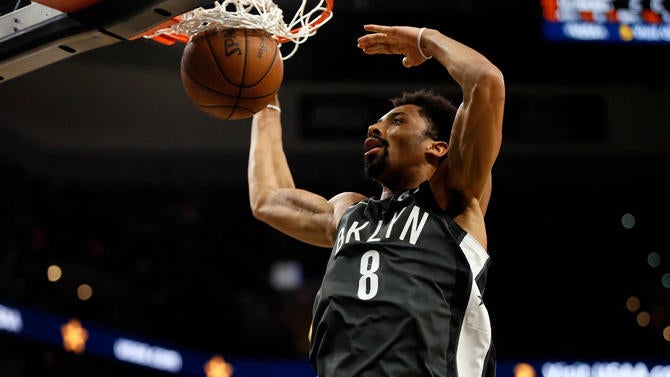
After an 87-85 loss to the Boston Celtics on Jan. 6, Dinwiddie complained that the referees weren't giving the Nets enough respect. He didn't like being waved off when he tried to talk to an official, and he said the team was frustrated with the way games were being called inside. Two days later, Brooklyn lost 114-113 to the Toronto Raptors in overtime, and Dinwiddie thought he was fouled by Serge Ibaka on a crucial possession. After the no-call, he turned to a courtside camera and said, "This is exactly what I was talking about." The next week, he explained why he can get so worked up.
"I don't think people get the mentality of somebody who's had to fight for everything," Dinwiddie said. "And not from the stereotypical way of like, oh, he grew up in the projects or the hood, he had to literally fight, or it was such an impoverished situation that he did this, that and the third. No, like, every step of my basketball journey I've been told I wasn't good enough."
Dinwiddie was called short and slow when he started high school. He was ranked No. 146 on the Rivals150 in 2011 and skeptics said he should have gone to Harvard instead of Colorado because of academics rather than choosing the best basketball situation. Then came the injury and three topsy-turvy years as a pro.
"You have all this pent-up aggression, anger, focus, adrenaline, you're going towards a goal and you feel like something's slighting you that you can't control," Dinwiddie said. "That's where the anger comes out."
Dinwiddie can now look back at the times when he was on the cusp, but not where he wanted to be. He understands that anyone can find themselves close to a dream job, then come up short. For most people, though, those failures aren't put on the world stage.
"When we fail, obviously the grand difference is everybody in the world then says you're a bum because you're 501st instead of 500th in the world," Dinwiddie said. "Out of 7.5 billion people, you were one spot short."
Being on the short end of the stick is never fun, Dinwiddie said, and he made it clear that he will do whatever he can to build on this breakout. In several tweets dating back to 2014, Dinwiddie has referenced The Incredible Hulk: In the 2012's The Avengers, Bruce Banner tells Captain America that his secret is he is always angry. If you are wondering how Dinwiddie has stayed strong, improved and made a name for himself, his secret is the same.
"If someone was like, 'Yo, you're ugly' every day of your life since you were 10, and you really felt like you were beautiful, you'd be like, 'Damn, these folks are mean.' Or you're going to grow to a place where you're like, f--- it, I'm still going to be a model. And that's the place that I grew to. It was like, I don't care what you say. I hear it. I hear you. I've heard it plenty of times. Don't worry. And that chip and that anger and that drive to be better, it's why I work the way that I do, why I do the things I do, why there is no reaction when I hit the shot. Or why I appear to be mad at myself sometimes. Because I don't believe in failure. I don't. I believe I can do anything, period.
"So when it's time to transform and I step on that court, why can I be here and be nice and chilling and then step on that court and turn into The Hulk or whatever? Because it's constant. I carry that with me. Everything that has happened, obviously, has made who this person is. So I carry all that. And that's why that transformation, the Jekyll, the Hyde, it's so easy."










